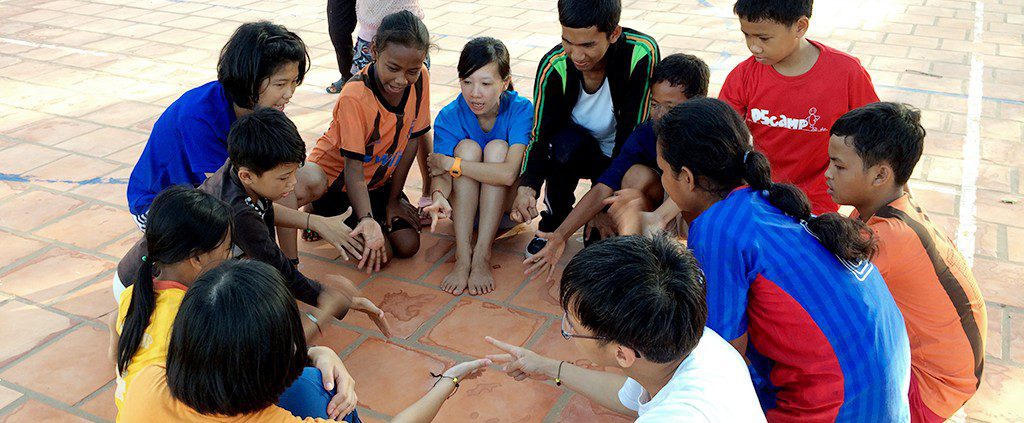What’s Gritty, Unpredictable and Intentional?
Written By Jolene Cheng, Singapore
It was close to 11 p.m. I had just finished leading a “challenging” night devotion with our young Cambodian friends about living a consistent life as a Christian.
The challenge, I found, was not just in terms of the lesson delivered but in the delivery of the lesson. My teammates and I struggled to convey biblical truths in simple English to the youths (who had an elementary grasp of the language) to then translate to Khmer for the rest of the youth. This process was especially tough when it came to biblical jargon. While Google Translate helped us at times, we were often left wondering if anything was lost in translation.
I asked Channa, a 19-year-old youth leader, what he thought about the devotion. “Thank you. It was a very good sharing but it’s very hard. I will try to explain to the boys tomorrow morning,” he replied. I was earlier told that Channa would gather the boys staying in the dormitory for devotions at 5:30 a.m. every Tuesday to Saturday. Such dedication floored me—would I be able to do likewise?
Thanks to such experiences and people that I met on my recent 11-day trip to Cambodia, I found my perspectives about missions shifting in ways I could never have imagined. I’m immensely thankful for what God has opened my eyes to see, yet at the same time soberly reminded of the weight of being made more aware.
1) Poverty is not just a lack of material wealth
I’ve come to a realization that poverty isn’t just about people lacking food, clothes, or money. Poverty is about a deeper brokenness that scars all humans. Surveys conducted by HOPE International revealed that “poverty is an empty heart, hopelessness, isolation, broken relationships and not knowing God.” I’m not in a better position to “help” because I’ve also experienced poverty that I cannot save myself from.
A particular late night sharing with two youths made me realize just how similar our journeys on earth were. They talked about their disappointments in people and the church, a family member with health troubles, struggles in school and work, and their dreams. We were more alike than different in our poverty.
I learnt that I could offer nothing but availability—being there to listen, to echo another’s thoughts, to offer temporary comfort, and to just be present. I should not unwittingly seek to usurp the void that only Christ can fill by worrying incessantly or trying too hard. I could avail myself in my limited time and resources but God is the infinite, daily presence who loves, gives hope and comfort to people.
2) Nothing beats building genuine relationships and discipleship
I’m not saying that we can turn a blind eye to abject poverty in countries like Cambodia, but building a genuine relationship with someone took on a new level of importance when I realized poverty was much more about a person’s heart. While it is important to execute an effective and relevant program, I felt that nothing beats getting up close with the people.
It is in those impromptu moments that we go deeper, and soak in as much as we can about each individual. For me, these came in the form of conversations during breaks or late at night, learning Khmer from our exasperated young friends, cycling on unstable bicycles in the rain, and visiting their houses. I felt that unstructured, free “play” was crucial in bridging our differences and bringing us closer to their real lives—not just seeing them for a mere two-hour program with minimal interaction.
“Go and make disciples” (Matthew 28:19). This four-word mandate often leaves me with feelings of guilt and inadequacy. And, true enough, this commandpricked my consciousness again in this trip.
It’s not as if this was new. Growth, life, sustainability, and regeneration in any ministry often start with empowering young people to lead. Young people like Channa, who desire to understand the Bible and whose heart is incredibly soft for people. And to lead well, they need mentors to shepherd them. Can you imagine if Channa had someone who walked with him, taught him God’s Word in the language that he understands? Imagine a few more Channas? There is so much potential.
I guess this is why mission work is gritty. It’s not instantaneous. It’s unpredictable. It’s intentional. It’s bold. It’s boring, hard work. It’s sacrifice. It’s definitely not about the numbers. It’s about that one person, one life, one conversation—the “now” moment. Mission work is fruitless without genuine relationships. Without genuine relationships, discipleship cannot begin. And all these need time.
3) We must love our brothers and sisters in the harvest fields with our prayer and going.
Who better to build these genuine relationships than the mission workers themselves? Every so often, I elevate missionaries on a pedestal because I think God has empowered them to be super-fighters for Him. But missionaries are humans too. I forget they are vulnerable to weaknesses, temptations, and difficulties like us. Perhaps we could learn to be less judgmental and demanding for results we think makes for a successful ministry. We do not hold the ministry together, God does. Missionaries do struggle and as a church, we need to love and support them with our prayer and going. When missionaries walk alongside those whom God has placed in their hearts, they need us to walk alongside them as well.
4) Mission exposure trips should be encouraged and it is important that they stay faithful to the heartbeat of the local ministry.
For the rest of us, busyness of life often consumes us. Sometimes we can only give limited time and resources to overseas missions. Here’s where short-term mission trips or mission exposure trips come in. My past experiences in missions have taught me what reading about missions would never have.
However, a week of planned program merely scrapes the surface of the ministry. Very rarely will we fully experience the true needs of the local ministry, much less understand and adapt to the local culture. That said, recognizing the constraints, we can focus on supporting the local co-workers in the work. That one-week of short-term mission trip for us could be a time for them to rest, reload, and roll again. For our team, we attempted to be proactive and diligent while there. We should also learn to pray for the ministry. Never underestimate what God can do with you in one week. The future of an individual’s role in missions is in the Lord’s hands. We just need to ask, trust, and wait for His leading.
And now what?
At the end of such trips, there is a tendency to slip back into routine, back into the comforts of our home. Even the busyness that gets us through the days seems much easier to deal with. I think if there ever were such a thing as a “successful” trip, it would be one that kicks us out of the deep pit of ignorance. Experiences that make us more aware, more unsettled, and more determined, teaching us to look around and see with new eyes our family and friends who God has placed around us.
Words are cheap without action. Start small, start somewhere.











Leave a Reply
Want to join the discussion?Feel free to contribute!